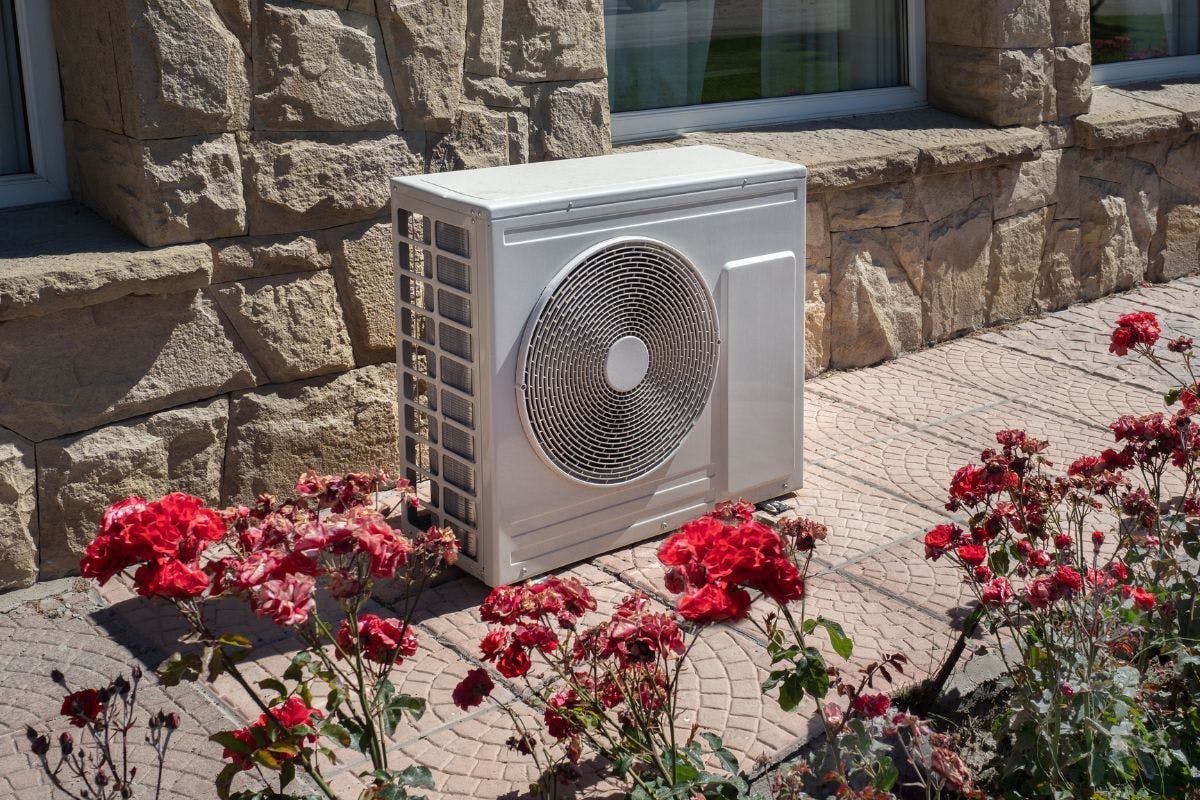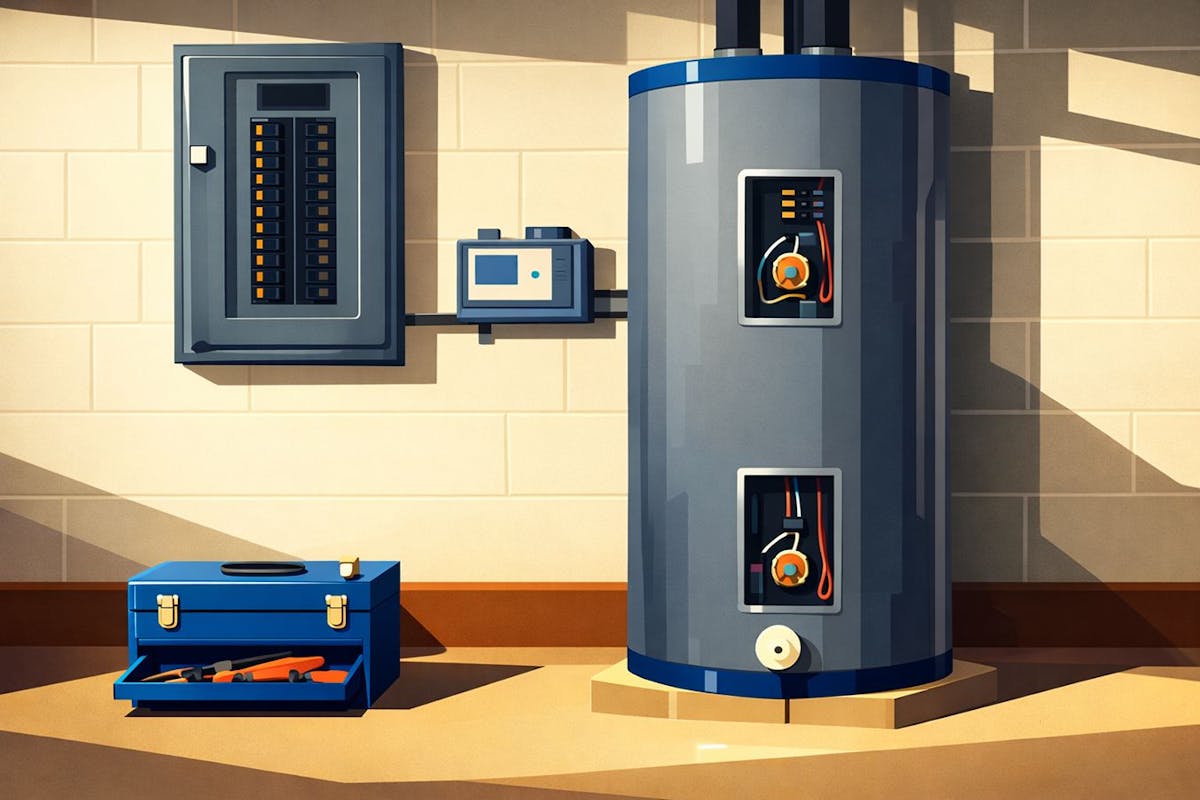Heat Pump vs. Furnace: Which Is Best for You?
Last edited
Author
Andrew Giermak
Solar and Electrification Writer and Editor
Editor
Andrew Blok
Electrification and Solar Writer and Editor

It's wise to explore your heating options before your current system breaks down. A new electric heat pump is often the most energy-efficient choice for both heating and cooling in most homes across the US. But how do you know if a heat pump vs. a gas furnace is the best fit for you?
This guide explains how a heat pump differs from a gas furnace and outlines the benefits and costs of switching to a two-in-one electric heat pump.
See how much you can save with a new HVAC system from Palmetto
Heat Pump vs. Gas Furnace
A heat pump doesn’t create heat; it moves it. Using electricity, it pulls heat from the outside air, even in cold temperatures, and transfers it into your home for heating. In the summer, it reverses this process to move heat from your indoor air outside, providing cooling.
A gas furnace generates heat by burning a fuel source. A fan then pushes this warm air through a system of ducts and vents to heat your home.
How a furnace works
Gas furnaces operate using natural gas or propane. When heating is desired, gas flows to burners and ignites, heating a heat exchanger. A fan then blows cool air over this hot exchanger, distributing the warmed air throughout your home while the furnace's exhaust gases are vented safely outside.
A furnace's energy efficiency is measured by its Annual Fuel Utilization Efficiency (AFUE). A rating of 98.5% AFUE means 98.5% of the fuel is converted into usable heat, making it the highest efficiency available for a modern gas furnace.
How a heat pump works
A heat pump runs on electricity but doesn't convert it into heat. Instead, it moves existing heat into or out of your home, making it incredibly energy efficient—up to 300% to 400% (or over 500% with geothermal systems). This means a heat pump can deliver three times or more heat energy than the electricity it consumes.
A heat pump uses a refrigerant that compresses and heats up, transferring heat to a coil and the air around it. When the refrigerant expands and cools, it absorbs heat from the air around the coil. A fan then blows air over this coil to either heat or cool your home. Because of this reversibility and high efficiency, a heat pump is an all-in-one heating and cooling solution for most homes and climates. While you might have heard heat pumps don’t work in cold climates, newer cold-climate models are capable of handling cold temperatures.
There are ducted and ductless mini-split heat pumps. Mini-split heat pumps are capable of being zoned heating and cooling systems. There are single-speed, dual-speed, and variable speed heat pumps, which can adjust their output for optimal efficiency. The most common heat pumps for homes are air-source heat pumps, with exterior units along the outside of a home. Ground-source or geothermal heat pumps draw heat energy from underground or underwater, typically in a small pond.

Benefits of Heat Pumps vs. Furnaces
Choosing a heat pump to replace a gas furnace or, more apt for most people, a furnace for heating and an air conditioning system for cooling, is about your priorities. Here are the main benefits with a heat pump.
- Two-in-one system: A heat pump gives you heating and cooling, saving you money with the upfront purchase and installation and ongoing maintenance costs.
- Comfort: You expect your HVAC to keep your home comfortable, with healthy air quality. Heat pumps provide more consistent warmth than a furnace. This leads to more even temperatures throughout your home.
- Energy efficiency: Since a heat pump moves heat, it is the most energy-efficient heating and cooling option. A heat pump can run at a coefficient of performance (COP) of 3.0 or higher. A 3.0 COP means it delivers 3.0 times the energy it consumes.
- Greener: Heat pumps are more friendly to the environment. They use electricity, which can come from renewable sources, like home solar panels. Since they don't burn fossil fuels in your home, they have a smaller carbon footprint and pose no risk of carbon monoxide leaks.
- Pair with solar panels: You can power a heat pump with free solar electricity from your roof. You can generate natural gas on your property.
- Home electrification: Getting rid of gas heating could be a big step in going to all electric appliances and systems in your home. Especially with home solar power for most or all of the electricity you use, home electrification can reduce your utility bills and give you greater energy independence.
See how much you can save with a new HVAC system from Palmetto
Cost of Heat Pumps vs. Furnaces
New heat pump sales (4.3 million) surpassed new gas furnace sales (3.9 million) in the US for the first time in 2022 according to the Air Conditioning, Heating, and Refrigeration Institute. Rising energy costs and the growth of heat pumps into more climatic and geographic regions are the main reasons.
Purchase and installation of a heat pump is generally more expensive than a gas furnace, although that’s not accounting for the two-in-one, heating and cooling capability of a heat pump vs. a furnace. A heat pump’s upfront cost spans from $5,000-$25,000 according to a range of sources, depending on type of heat pump, home size, heat pump size, efficiency ratings, brand, and installation work (e.g. ductwork, renovation, electrical work). The range for a new gas furnace is $3,800-$12,000 according to a range of sources.
The likely savings with a heat pump come in the long run. According to the National Renewable Energy Laboratory, 62%-95% of US households would have lower energy bills with a heat pump. For the 49 million US homes that use electricity, fuel oil, or propane for heat, the average annual savings ranges from $300-$650, depending on the heat pump's efficiency. An air-source heat pump’s average lifespan is about 15 years. A geothermal heat pump can last 25 years or longer.
Power a heat pump with solar electricity from your roof and you could save even more.
Is a Heat Pump or Furnace Better for Your Home?
Choosing a heat pump vs. a furnace for your home's heating depends on your priorities. When considering your budget, weigh the upfront cost of a new system and its installation and your area's electric and gas rates. A heat pump may have a higher initial cost, but its energy efficiency often leads to long-term savings on utility bills.
Local climate is a factor, but modern heat pumps are more effective in colder regions than ever before. While a furnace may still be the most powerful option for extremely cold winters, a heat pump can be a highly efficient primary system for most climates. Finally, if you have solar panels, a heat pump is more likely to be an ideal choice. Running your heat pump on solar power can maximize your savings and clean energy usage.
For more information and estimated savings, visit our HVAC advisor, home energy advisor, or our solar savings calculator.
See how much you can save with a new HVAC system from Palmetto
Frequently Asked Questions
How is a heat pump different from an electric furnace?
A heat pump and an electric furnace use electricity, however, a heat pump moves heat in to or out of a space whereas an electric furnace is generating heat from the electric power. A heat pump is much more energy efficient than an electric furnace.
What is a heat pump?
Heat pumps can heat or cool an indoor area, such as your home, by moving heat from outside to in, or it cools indoor space by moving heat from indoor air to out. A heat pump uses electricity to move heat, but it doesn’t consume electricity or another fuel source to create heat.
Do heat pumps work in cold weather?
Modern heat pumps work better in cold weather than ever before. Specifically, cold climate heat pumps are built and certified to work at 5 degrees Fahrenheit or colder.


